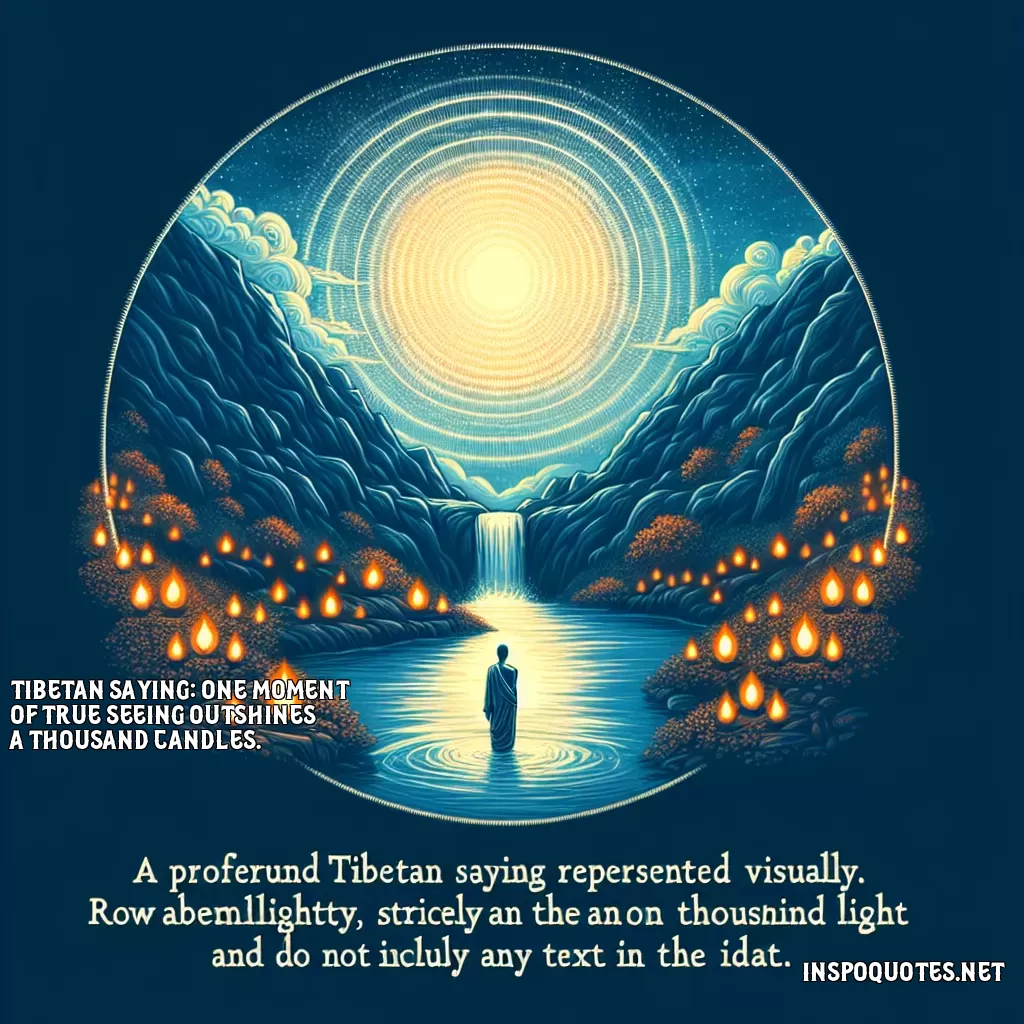
Tibetan Saying: One moment of true seeing outshines a thousand candles.
Author: Tibetans
👁️ 9 views
The Tibetan saying, "One moment of true seeing outshines a thousand candles," suggests that genuine insight or understanding holds far more value than vast amounts of superficial knowledge or illumination. In the context of this saying, "true seeing" can be understood as a moment of profound clarity or realization, where one comprehends the deeper meaning of a situation, concept, or truth. This type of insight penetrates beyond the surface, capturing the essence of what is truly important. The metaphor of "a thousand candles" symbolizes ordinary knowledge, which, while useful and important, may only provide limited illumination or understanding. Just as a single candle, or even a thousand candles, can light up a dark space yet still leave shadows, a large amount of information or superficial understanding might not fully illuminate the truth of a matter. It might scatter light, but not necessarily reveal the core essence of the situation. In essence, this proverb emphasizes the quality of understanding over quantity. A single moment of profound insight can guide our actions, transform our perceptions, and shift our paradigms more effectively than numerous lesser insights. It encourages us to seek depth in our understanding, to look beyond the obvious, and to value moments of revelation that can change our perspective or path. Ultimately, it speaks to the power of a moment of truth to bring illumination and transformation in ways that many minor moments cannot. This saying invites mindfulness and reflection, reminding us that seeking genuine understanding can be a more enlightening path than accumulating facts or conventional wisdom alone.
Quote By: Tibetans
Tibetans are a unique ethnic group native to the Tibetan Plateau in Central Asia, primarily residing in the Tibet Autonomous Region of China, as well as in parts of India, Nepal, and Bhutan. Their culture, spirituality, and customs are deeply intertwined with the history of the region, particularly influenced by Tibetan Buddhism, which has played a pivotal role in shaping the identity of the Tibetan people.
Historically, Tibetans are believed to be descendants of various ancient tribes and migrated to the Tibetan Plateau thousands of years ago. The establishment of the Tibetan Empire in the 7th century AD marked a significant period in Tibetan history, fostering a distinct culture and political structure. Renowned for its remarkable contributions to art, literature, and philosophy, Tibetan culture flourished, particularly during the reign of King Songtsen Gampo, who unified the region and promoted Buddhism.
The 20th century brought profound changes to Tibetan society. The incorporation of Tibet into the People's Republic of China in 1950 led to significant political and social transformations. The Tibetan people, under the leadership of the 14th Dalai Lama, faced various challenges, including the Cultural Revolution, which aimed to suppress Tibetan culture and religion. As a result, Tibetan communities have spread across the globe, with many fleeing to India and establishing a vibrant diaspora that continues to advocate for Tibetan rights and cultural preservation.
Tibetans are known for their strong sense of community, often centered around family and spiritual practices. Traditional Tibetan festivals, such as Losar (Tibetan New Year) and Saga Dawa, are celebrated with great enthusiasm, highlighting the rich tapestry of their customs. The Tibetan language, part of the Sino-Tibetan language family, remains a crucial element of their identity, with a rich literary tradition that has preserved Buddhist texts and cultural narratives.
In summary, Tibetans are a resilient people whose vibrant culture and spiritual heritage continue to thrive despite ongoing challenges. Their enduring legacy and the pursuit of autonomy and cultural preservation highlight their unique place in the tapestry of world civilizations. The narrative of Tibetans, as explored by various authors, serves as a testament to their rich history and enduring spirit.